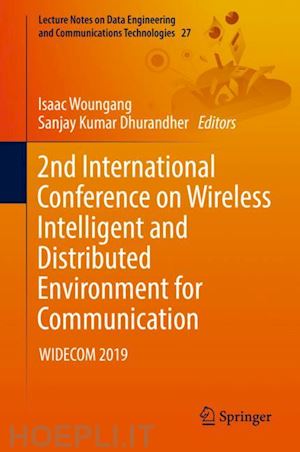
Questo prodotto usufruisce delle SPEDIZIONI GRATIS
selezionando l'opzione Corriere Veloce in fase di ordine.
Pagabile anche con Carta della cultura giovani e del merito, 18App Bonus Cultura e Carta del Docente
Chapter 1. Performance Evaluation of G.711 and GSM Codecs on VoIP Applications using OSPF and RIP Routing Protocols.- Chapter 2. Cyclic Redundancy Check based Data Authentication in Opportunistic Networks.- Chapter 3. Hybrid Cryptographic Based Approach for Privacy Preservation in Location Based Services.- Chapter 4. Design of Energy-Aware PRoPHET and Spray-and-Wait Routing Protocols for Opportunistic Networks.- Chapter 5.An Asymmetric RSA based Security Approach for Opportunistic IoT.- Chapter 6. Performance Analysis of A* Based Hop Selection Technique in Opportunistic Networks through Movement Mobility Models.- Chapter 7. Data Loss Prevention Using Document Semantic Signature.- Chapter 8. Data Loss Prevention Using Document Semantic Signature.- Chapter 9. PSARV: Particle Swarm Angular Routing in Vehicular Ad hoc Networks.- Chapter 10. A Reliable Firefly-based Routing Protocol for Efficient Communication in Vehicular Ad Hoc Networks.- Chapter 11. Exploring the Application of Random Sampling in Spectrum Sensing.- Chapter 12. White-box Cryptography: A Time-security Trade-off for the SPNbox Family.- Chapter 13. CESIS: Cost Effective and Self-regulating Irrigation System.- Chapter 14. Maximum Eigenvalue based detection using Jittered Random Sampling.- Chapter 15. Prevention of Flooding Attacks in Mobile Ad hoc Networks.- Chapter 16. Prevention of Flooding Attacks in Mobile Ad hoc Networks.- Chapter 17. Real Time Spectrum Occupancy Prediction.- Chapter 18. SCC-LBS: Secure Criss-Cross Location Based Service in Logistics.
Professor Isaac Woungang received his Ph.D. degree in Mathematics from the University of South, Toulon and Var, France. From 1999 to 2002, he worked as a software engineer in the Photonic Line Systems Group, Nortel Networks, Ottawa, Ontario, Canada. Since 2002, he has been with Ryerson University, where he is now a full professor of Computer Science and Director of the Distributed Applications and Broad band (DABNEL) Research Lab. Dr. Woungang has published 10 books and over 92 refereed technical articles in scholarly international journals and proceedings of international conferences. He has served as Associate Editor of the Computers and Electrical Engineering (Elsevier), and the International Journal of Communication Systems (Wiley). He has Guest Edited several Special Issues with various reputed journals such as IET Information Security, Mathematical and Computer Modeling (Elsevier), Computer Communications (Elsevier), Computers and Electrical Engineering (Elsevier), and Telecommunication Systems (Springer). From 2012 to 2017, he served as Chair of Computer Chapter, IEEE Toronto Section.
Professor Sanjay Kumar Dhurandher received the M. Tech. and Ph.D. Degrees in Computer Sciences from the Jawaharlal Nehru University, New Delhi, India. He is presently working as a Professor in the Department of Information Technology, Netaji Subhas University of Technology (Formerly NSIT) New Delhi, India. He is also the Head of the IT Department at NSUT and the Head of the Advanced Centre CAITFS, Department of Information Technology, NSUT, New Delhi. He is a Senior Member of IEEE.Currently, he is serving as the Associate Editor of the International Journal of Communication Systems published by John Wiley & Sons and even as the Associate Editor of Security and Privacy Journal, by John Wiley & Sons. He served as a Guest Editor, to the Special Issue of Computers & Electrical Engineering by Elsevier and IET Communications. He has even written/edited a book titled “Routing in Opportunistic Networks” published by Springer. From 1995 to 2000 he worked as a Scientist/Engineer at the Institute for Plasma Research, Gujarat, India which is under the Department of Atomic Energy, India. His current research interests include Wireless ad-hoc Networks, Sensor Networks, Computer Networks, Network Security, Underwater Sensor Networks, Opportunistic Networks and Cognitive Radio Networks.











Il sito utilizza cookie ed altri strumenti di tracciamento che raccolgono informazioni dal dispositivo dell’utente. Oltre ai cookie tecnici ed analitici aggregati, strettamente necessari per il funzionamento di questo sito web, previo consenso dell’utente possono essere installati cookie di profilazione e marketing e cookie dei social media. Cliccando su “Accetto tutti i cookie” saranno attivate tutte le categorie di cookie. Per accettare solo deterninate categorie di cookie, cliccare invece su “Impostazioni cookie”. Chiudendo il banner o continuando a navigare saranno installati solo cookie tecnici. Per maggiori dettagli, consultare la Cookie Policy.